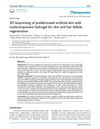Hair Follicle Stem Cell Replication Stress Drives IFI16/STING-Dependent Inflammation in Hidradenitis Suppurativa
April 2020
in “
Journal of Clinical Investigation
”
hair follicle stem cells hidradenitis suppurativa replication stress progenitor cells quiescent stem cells replication fork progression ATR/CHK1 pathway cytosolic single-stranded DNA outer root sheath cells DNA damage response cytoplasmic ssDNA micronuclei interferon synthesis IFI16/STING pathway HFSCs HS ssDNA ORSCs

TLDR Stress in hair follicle stem cells causes inflammation in a chronic skin condition through a specific immune response pathway.
The 2020 study "Hair follicle stem cell replication stress drives IFI16/STING-dependent inflammation in hidradenitis suppurativa" investigated the role of hair follicle stem cells (HFSCs) in hidradenitis suppurativa (HS), a chronic skin condition. The research involved a varying number of participants, with a maximum of 28 HS patients and 15 healthy donors. The researchers found that HS patients had an increased number of proliferating progenitor cells and a loss of quiescent stem cells, which was associated with spontaneous replication stress. This stress led to alterations in replication fork progression, activation of the ATR/CHK1 pathway, and accumulation of cytosolic single-stranded DNA (ssDNA). These alterations were specific to HS-outer root sheath cells (ORSCs), suggesting a cell-intrinsic control of replication stress and DNA damage response in skin. The study also found that these cells accumulated cytoplasmic ssDNA and micronuclei, inducing interferon synthesis through the IFI16/STING pathway. The results suggest that the lack of quiescent stem cells is due to increased stem cell differentiation and not to destruction of HFSCs.





